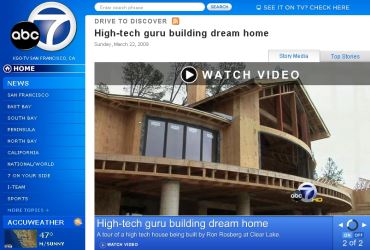Among other things, this past decade will be remembered for breaking with tradition from the prior eras. For instance, in the first decade of the 1900s, years beginning with ZERO were called AUGHT (ie. Professor Henry Hill from The Music Man, who graduated from Gary Conservatory with the Class of Aught-Five). However, even though we chose to speak in thousands during the first decade, the consensus is that we will be back on track in the second decade and beyond, calling next year twenty-ten, instead of two-thousand-ten.
What will the first decade of the 3rd Millinium be remembered for as far as technology? We believe that there were quite a few transformative, if not disruptive, technologies that changed the face of technology during the past decade, so we discussed this till we were blue in the face and tallied our list below. This list is NOT in order of importance, because that is something we could NOT agree on, but ask us in another decade, and we'll tell you which ended up being the most important.
- Camera Phones - At the turn of the century, the market for digital cameras was growing explosively, and while many phones had cameras, we weren't yet satisfied enough with the images produced to make them our only digital imaging device. However, as we lowered our standards and stopped printing pictures, we found that screen resolution images were all that we really needed. Today, if you give your child a digital camera, they would look at you cross-eyed, and if you gave them a phone without a camera, they would take it as a great insult.
- Apps - Prior to the iPhone, "app" was a term used only by software developers, but Apple and Facebook changed all of that, and today, the "app" is a term that everyone understands, and the number of available apps for phones and apps and widgets for websites grows by hundreds of thousands each year.
- Music Downloads - The decade staMrted off with a rush by college students to download as much music as pssible for free via peer networks, but a lawsuit cripled Napster and the record industry started taking action against a few students to make examples of them. This opened the door for iTunes to step in and replace Napster as the top legal source of inespensive music, typicaly 99 cents per song. The fall of Napster and th erise of iPhones and iTouch positioned Apple in the digital downloads driver seat, and soon, recording artists were selling more songs via iTunes than via all brick-and-morter distribution channels combined.
- Social Networking - First, MySpace introduced social networking millions of mostly younger people and LinkedIn introduced the concept to business people, but it wasn't till Facebook grew out of the college environment into the mainstream that there was one social networking platofrm that everybody participated in. In the latter part of the decade, twitter introduced the concept of micro-blogging and it took off like a storm, especially with the media who loved the one-sentence spiffy comments from their viewing public. The editors of Gadget Gurus had a discussion recently, and we believe that by the end of the next decade, only Facebook will still have be a major player on the net.
- HD TV - At the start of the decade, standards folks in the US were still arguing over the format of HD TV in the US while the Japanese were already enjoying their new sets. While officials in the US argued, the Japanese started importing their sets and the professional cameras, and when the first HD sports broadcasts were made, 16x9 became the defacto standard. Unfortunately, however, lacking official guidance, US consumers still had to endure the HD-Ready, 1080i, and 720p interim technologies, till finally at the end of the decade, everyone was selling 1080p devices (although broadcast and cable companies were still delivering at 1080i or 720p, and probably will for some time due to bandwidth and infrastructure issues).
- Netbooks - This decade will be remembered as the one where the number of laptops sold outpaced the number of desktops, and in the midst of a recession, netbooks absolutely skyrocketed as many households and business people clammored for a smaller cheaper laptop for around-the-home and travel use.
- DVR - Once you learn to use a DVR to watch TV on YOUR schedule, you simply can't go back to being a slave to broadcast time slots. DVR use also changed the nature of television commercials as broadcasters had to find new ways to pay for their programming with nearly 50% of viewers skipping the commercials. By the end of the decaded, sponsorship and product placement became the most important jobs in ad agencies.
- eBooks - By the end of the decade, Amazon reported that they sold more downloaded titles than they did tree-killing paper books. When you add in Google's free Out-of-Print books, there are now more than one million book titles available electronically, and EVERY new title delivered to market will be available electronically from this point forward. The battle today, therefore is over the eReader, the software and/or hardware which will be used to view books. At the turn of the decade the eReader battle is heating up with more than a dozen players each fighting for exclusive content contracts and selling various features. We still don't know whether books of the future will be read on dedicated eReaders, laptops, tablets, or phones, but we do know that a "war" is about to be waged, and that it will take some time for the dust to settle.
- Blu-Ray - The decaded started with two competing technologies for HD quality movie delivery, HD and Blu-Ray. A tit-for-tat battle insued in the middle of the decade as each announced exclusive partnerships with movie studes, and in a dizzying three month period of back and forth announcements, Blu-Ray finally emerged as the one with the best and most potential movie titles, and the war was over, leaving tens of thousands of early adopter HD-DVD device owners feeling like BetaMax owners.

 Gadget Gurus technology reviews are heard and read by millions of people across the United States, including more than a dozen
Gadget Gurus technology reviews are heard and read by millions of people across the United States, including more than a dozen 